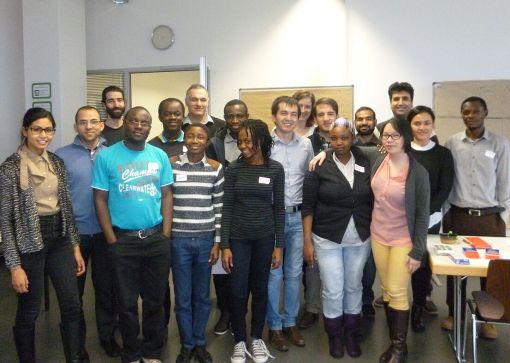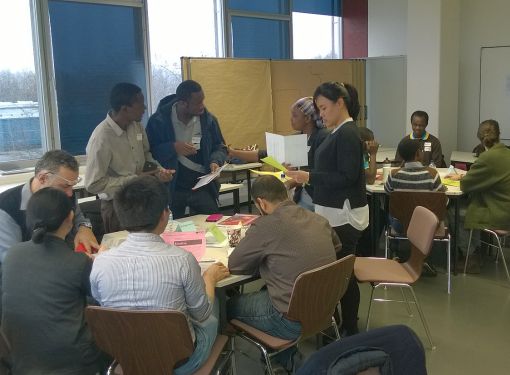For many graduates of Development-Related Postgraduate Courses (EPOS) it can be a challenge to reintegrate into life back home after studying abroad. Special reintegration courses are now available to help ease the transition. The first of its kind was a course offered jointly by TU Dortmund and Ruhr University Bochum.

First reintegration course: Together, students of TU Dortmund and Ruhr University Bochum prepare for their return to their local job market © Robin Pass
The father, ever-mindful of the family’s standing and reputation, wants his daughter to work for a government ministry. But the daughter, who has just completed her studies abroad, would rather avoid the whirl of corruption so prominent there. So she starts looking for a job elsewhere and asks her friends and acquaintances for help. One acquaintance offers to introduce her to the non-governmental organizations in the country’s interior, but only if she can help him get acquire a car in Germany.
According to Dr. Julia Boger from World University Service (WUS), an international organization that provides support to foreign students, the example above is a typical experience for graduates from developing countries who return home after completing their studies abroad. To help with this transition, Boger’s workshops – and reintegration courses such as the one in Dortmund – address issues such as expectations among family and friends, the local job market, time management, career management, as well as job application training. Participants in Dortmund included 26 degree candidates in the Master’s programmes “Spatial Planning for Regions in Growing Economies” (SPRING) and “Development Management”.
For all degree programmes
The longer-term plan is to offer the reintegration course to all 38 members of the German Association of Postgraduate Programmes with special Relevance to Developing Countries (AGEP). As network coordinator Robin Pass reports, a survey of alumni in East Africa and employers in Kenya revealed that graduates are not sufficiently prepared for the transition back home. “Time and again we would hear how much need there is for this kind of a course,” says Pass. “And the positive feedback from the participants shows that we’re on the right track.”
Before her acceptance into the SPRING programme in Dortmund, Vivian Agyei worked for the regional administration in Ghana. She learned as part of the seminar that she can count on support from Germany even after returning home, including job-search assistance and advice from the consultants at the Centre for International Migration and Development (CIM). According to Agyei, the employment/job-placement agency in Ghana is not fully functional.

As part of one workshop exercise, the students simulated the job search process and took on roles of family members, friends, potential employers and support organisations © Robin Pass
Neutral job placement services rather than friends and family
According to Julia Boger, one job of the workshops is to build trust in institutions. As part of one workshop exercise, the students simulated the job search process and took on roles of family members, friends, potential employers and support organisations. “Participants often realize that working with CIM placement agents is a lot faster and more efficient than relying on their circle of friends of family.”
Workshop participants also learned about applying for jobs with German or international employers. “I didn’t realize how long it takes to put together a job application that responds specifically to the advertised position,” says Eliab Figueroa Hernandez, who studied “Development Management” in Bochum, Germany. Hernandez had worked previously in Mexico for the government, for a university and for American Express, but had never experienced a job interview in which the interviewer tries to rattle the interviewee. Hernandez’s goal is to work in Germany or other country in the area of development cooperation with Mexico. “The workshop taught me that the application process can be very different than what I know from my own country – and that I need to be better prepared.”
For further information about reintegration please visit our page “back home”.





